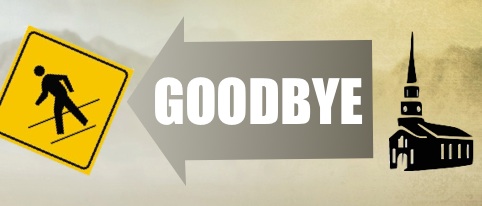They are not shut-ins with protracted health problems. They have every means necessary to attend a Bible-believing church, but simply choose not to. They are not unreached. I am not writing about those who live in places with few or no open expressions of Christian faith like North Korea or Iraq. I'm not talking about those who are imprisoned for their faith. Dietrich Bonhoeffer is off the hook in this article. I should also clarify that I am not talking about the paradigm of local churches meeting in homes. This article is about ecclesiology (our view of the nature of the church) not architecture (what type of buildings Christians should meet in).
I'm talking about that ever-growing demographic of people who have every opportunity to attend a local assembly of confessing Christians, but simply choose not to. They got bored and left. They got offended and never came back. Someone sat in their pew and they got ticked. They lost a close vote at the board meeting and split, never to darken the doors again. The pastor said the wrong thing on the same day the band played the wrong song. Whatever.
If you ask them, they will say devoutly, "I worship at home. I have a personal relationship with Jesus Christ. I read my Bible. But I don't need the church."
Sometimes you will recognize a S.A.H.C. by their particular vocabulary. Church for many is merely "organized religion." And they want no more of it. (I am always tempted to ask in a snarky tone whether they would prefer the opposite, "disorganized irreligion," but I usually don't go there).
But to pose the question more directly: are these professing Christian believers actually closer in practice to cults than orthodox Christianity?
One of the definitive works on cults, is Walter Martin's The Kingdom of the Cults. To my knowledge, he does not mention this classification of people. So they're orthodox, right? Not so fast.
To answer my own question more precisely, we will have to look at the typical markers of a cult and see whether or not Stay-at-Home Christians would qualify. Let's consider several.
A) Authoritarian and Unchallengeable Leadership. For instance, in the Jehovah's Witnesses cult, the headquarters of the Watchtower Bible and Tract Society is unchallengable. No mere member has the right to question their teaching. Or correct their interpretation. The same with the Branch Davidians. All directives go downward, from the top.
Although Stay-at-Home Christians do not have any formal leadership structure at all, with each man functioning as his own senior pastor and guru, that's exactly the problem. It is worrisome to me when one's own opinion is regarded as the highest and best. Who else would he listen to? What other voice can he heed? He has no one to whom he submits, excepting his own conscience. He carries out his religious practices at his own dictate. In a sense, he acts as his own personal pope and bishop. RATING: SEMI-CULTIC.
B) Lack of Accountability. In most cults, there is no process by which a "person in the pews" can call a leader into account. There are no presbyteries for accountability. There are no General Assemblies, or Regional Conferences to whom one may appeal for help or to reign in an unrepentant leader. In the case of moral failure, (sexual, financial or otherwise) no one can call the leadership into account. No one can hold their feet to the fire. For this reason, cult leaders often are able to get away with much sinful license that orthodox church leadership cannot. In fact for the cult, accountability is a bad idea. Accountability would only get in the way of a leader's pursuit of his own passions and power. He doesn't want any speed bumps.
So too, I think, with the S.A.H.C. If a man or woman falls into sin - for instance marital infidelity - there is no "church disciplinary" process that automatically kicks into affect. As a Presbyterian minister myself, if I committed adultery, I would have to face a Presbytery commission to reprimand me. But who is in a position to reprimand the S.A.H.C.? Sure, a person could check themselves into rehab or turn oneself into the police in extreme cases. But would he have to? Of course not. There are no council of elders, or deacon board, or ranking bishop to call one to accountability. There is no congregation to vote out the leader because he is both the congregation and the leader. RATING: CULTIC.
C. Unorthodox Theology. Cults are known for their unorthodox theology that veers far from the historic Christian faith. Cults do not profess such historic documents as the Apostles Creed or Nicene Creed or the Chalcedonian Definition. Neither do they profess the confessions of Reformation-era Christianity such as the Westminster or the Heidelberg. Their views of Jesus (Christology) are all over the map. Doctrines such as the Trinity and the eternality of Hell are usually the first to go. After that is the infallibility of Scripture. While some go far afield in sexual ethics, (the Mormons and polygamy for instance), others still attempt to live holy, if legalistic lives.
As for Stay-at-Home Christians, their theology and doctrinal convictions are impossible to categorize since the wide scope of their beliefs are unique to each individual person. Each man defines truth for himself. One man may believe this, another that. In fairness, a Stay-at-Home Christian may know his Bible better than most. But maybe not. Who knows? There is no one there to correct him. No one there to teach him or steer him away from error. One S.A.H.C may quite like the Westminster Catechisms, while another cannot even define "justification." Another likes Oprah's views. Still another the preaching of Joel Osteen. Their theology is simply too messy to attempt to analyze. The point is, there is no way to tell. RATING: QUESTIONABLE.
D. Ecclesiology and Sacramentology. Cults often have very unique definitions of the church itself and the sacraments (or ordinances) of the Lord's Supper and Baptism. Many simply will not practice them at all and create their own pseudo-sacraments. These expressions of corporate faith are as variant as they are numerous.
As for S.A.H.C.'s their expressions of the church cannot possibly be orthodox, in my view. The very word "church" in the NT Scriptures (Greek: ekklesia) is plural and means "called out ones." A lone individual can be a member of a church, but not the church. One can be a member of the body (to use Paul's analogy in Romans 12 and 1 Corinthians 12), but he cannot be the whole body.
Since it is impossible to baptize oneself or serve oneself the Lord's Supper (all of Paul's dictates to the Corinthians about the Lord's Supper presuppose a corporate gathering of believers) we have to assume that both the ecclesiology and understanding of the Biblical ordinances of the S.A.H.C. movement is deeply flawed. RATING: CULTIC.
E. Other Beliefs and Practices. On the other hand, there are probably dozens of practices of S.A.H.C.'s that do not evidence cult-like behaviors at all. I don't sense a strong desire on the part of this movement to manipulate or control people, for instance. Neither do I detect a strong evangelistic outreach or campaign to win people to their views, as is often evidenced in many cults. I don't see much financial motivation to work Ponzi Schemes over on people, and undo their adherents financially as many cults have been wont to do. The only possible financial motivation I can detect in this movement is probably a reticence to tithe of their income to any local church. RATING: NON-CULTIC.
Conclusion
In conclusion, then, while probably not cults by any traditional definition, we do find some disturbing patterns among Christians who profess Jesus Christ as Savior, but who eschew the Church that He bought with His own blood (Acts 20:28). Many of the foundational beliefs and patterns appear cultist in some respects, and many others are borderline, albeit without any motivations or aspirations towards gaining power among a great many followers.
I believe we should show great concern and love for those who reject the corporate expression of the Body of Christ (Romans 12:3-8; 1 Corinthians 12:12-14). I think their position is precipitous in many ways without necessarily being outright heretical.
In some cases, we ought to regard S.A.H.C.'s as sincere believers who have back-slidden considerably, and are in great need of the love and care of a local church. In other cases we ought to treat them as those who have yet to be converted (1 John 2:19). Certainly great grace should be shown on our part, and no little charity as well.
Matthew Everhard is the Senior Pastor of Faith Evangelical Presbyterian Church in Brooksville, Florida.





